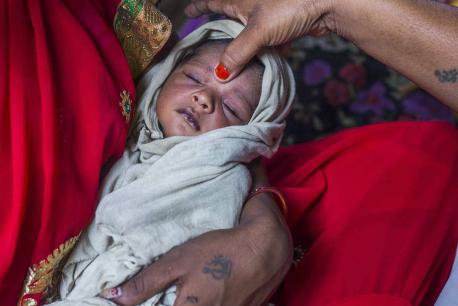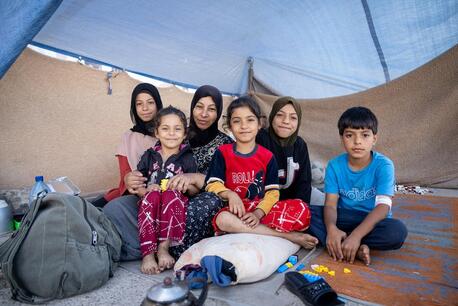
This Diwali, UNICEF Brightens the Days of Children in Need
Diwali is almost here, and soon families in India and around the world will come together to reflect upon the many gifts life has to offer. But as they prepare to celebrate the festival of lights, there are still far too many children who live in the long, dark shadows of poverty, conflict and violence.
For over 70 years, UNICEF has worked to provide children living in some of the world's toughest places all the essentials they need to survive and thrive. Over the past two decades, that work has paid off for children in India, where striking improvements in child survival have given families who have lived in poverty for generations hope that their children will finally break free. UNICEF has fueled those dreams by delivering the nutrition, health care, clean water, education and protection every child needs to live a full, happy and healthy life.
Below, a glimpse of UNICEF's impact in India.

As the Indian government’s lead partner in safeguarding children's health, UNICEF helps women before they conceive right through pregnancy, labor and delivery to ensure both they and their children are healthy and safe. Once babies are born, UNICEF continues to protect mother and child with such support as the free medical care Kavita and her baby received. These programs have helped bring down India’s maternal mortality rate significantly, from 280 deaths per 100,000 live births in 2005 to 174 deaths in 2015. © UNICEF/UN0270932/Mukherjee AFP-Services

It's Health and Nutrition Day at the Motipur Kala Aanganwadi Center — a high point of area moms' months. Thanks to the UNICEF-IKEA Foundation, centers like this one in Shrawasti, Uttar Pradesh, are a one-stop shop for children's health, offering kids up to age 6 a full range of services, including free medical check-ups and healthy and nutritious food to take home. UNICEF India/2018/Prashanth Vishwanathan

This toddler has received all her routine immunizations and been checked for malnutrition at the local primary health care center. Here, a collaboration between the Government of Gujarat and UNICEF is protecting children from preventable diseases and making sure they are getting enough of the right kind of food to thrive. © UNICEF/UN0269584/Hajra

This 13-year-old boy was rescued from a bangle-making factory in Hyderabad in 2015. The UNICEF-IKEA Foundation is supporting community-based protection systems to stop child labor and help victims like this young boy reclaim their right to a childhood. © UNICEF/UN0280907/Vishwanathan

Across India, UNICEF supports girls like Kiran Bauri (above), who are mobilizing other girls, schools and their communities to speak out against child-rights violations, including early marriage. Kiran is only 18 but already she's become a staunch advocate for girls in her community. Last year, she saved her friend from early marriage by reporting the case to local authorities. Kiran hopes to become a lawyer so that, one day, she can more effectively address the challenges girls face. © UNICEF/UN0276237/Boro

UNICEF provides water, sanitation and hygiene (WASH) in India's schools, like this one in India's northeast, where kids learn how important hand-washing is to their health and well-being. UNICEF-supported WASH programs also improve girls' chances of getting educated by ensuring they have access to the private sanitation facilities that keep them coming to school even during their monthly periods. © UNICEF/UN0274921/Panjwani
Top photo: This newborn sleeps through a visit from her UNICEF-IKEA Foundation-supported health care worker who stopped by to see how she and her mother are doing. After a safe delivery, a newborn requires tender care to make it safely through the first thousand days of life. UNICEF and IKEA are working together in India to see that babies get everything they need, including helping mothers understand the importance of breastfeeding for the first six months of their infants' lives. © UNICEF/UN0281016/Vishwanathan
HOW TO HELP
There are many ways to make a difference
War, famine, poverty, natural disasters — threats to the world's children keep coming. But UNICEF won't stop working to keep children healthy and safe.
UNICEF works in over 190 countries and territories — more places than any other children's organization. UNICEF has the world's largest humanitarian warehouse and, when disaster strikes, can get supplies almost anywhere within 72 hours. Constantly innovating, always advocating for a better world for children, UNICEF works to ensure that every child can grow up healthy, educated, protected and respected.
Would you like to help give all children the opportunity to reach their full potential? There are many ways to get involved.





